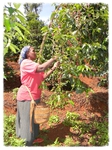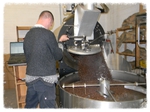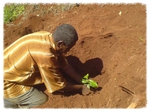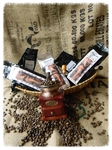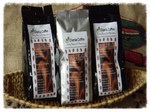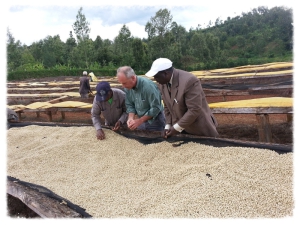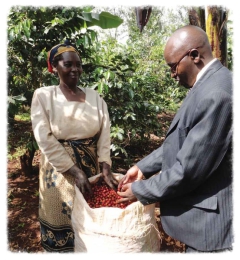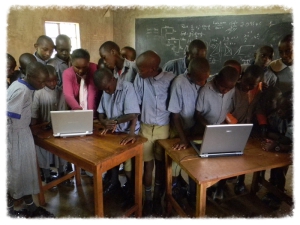Sustainable Coffee Farming in Kenya
1.Sourcing of Green coffee beans from origin - Direct Trade between farmers and roasters
A tradition of Chania Coffee is to connect Roasters and the small-scale coffee producing communities in Nyeri; central Kenya .We facilitate and support direct roaster-farmer relationship,
where Roasters and farmers work side by side together and in doing so the roasters are at the forefront in bringing their customers Direct Trade Kenyan coffee.
By Partnering with the farmers at origin the Roaster is able to deliver the highest quality Kenyan coffee, and the farmers are paid a fair price ensuring sustainable livelihoods for the coffee producing communities.
All our coffees are 100% Arabica coffees.
We offer coffee sourcing and consultancy services to commercial roasters in Germany and the European market through a more transparent process to ensure the success of both the small scale farmers and the roasters.
2. Professional roasted coffee - fresh roasted beans or fresh ground
All our coffees are freshly professional roasted at Quijote-Kaffee in Hamburg. The coffee is roasted in small batches and freshly packaged in a One Way Valve de-gassing packaging system to ensure the coffee's fullest expression of flavour and aroma that is distinctive of Kenyan coffee.
This careful roasting process is what results in a distinctly smooth an un-bitter cup.
Education for Sustainable Development
Through the Non Profit Organisation Kedovo e.V of Germany, we work closely with the coffee producing communities in Nyeri Kenya, and facilitate Sustainable coffee farming that guarantees fair prices to the producers and enhance Rural Development.
We put a lot of emphasis on Education and we support the education requirements for the children of our coffee producers.
Project Goals:
Our overall goal is to ensure Sustainability for the farmers by making sure that the money is being put back into these impoverished coffee producing communities to stimulate growth out of poverty.
We want the farmers to be able to provide for themselves.
KEDOVO e.V intervention will be:
1. Optimization of the coffee sourcing and distribution processes
1. Train the farmers on how to improve coffee productivity and quality.These trainings will be led by qualified trainers who have been trained in Sustainable Agriculture.The farmers will be taking an
active role in ensuring that the coffee is grown, harvested, sorted and graded in the highest quality possible.
2. Set up a Coffee Quality Testing Centre, which would assess the quality of the local farmer's coffee, and in so doing the farmers would learn and appreciate what a buyer looks for in
coffee.
Most of the farmers being small-scale have formed cooperatives which inturn sell their coffee to a miller. The miller does the assessment himself and then declares the quality of the coffee, then
dictates how much he would pay for the crop! The farmers are completely excluded from this process!
A quality testing centre ran by the farmers in conjuction with KEDOVO e.V would give the farmers a bargaining power with the millers as they have a way of knowing in advance how much their crop is
worth before delivering it to millers.
3.Facilitate farmer grouping to ensure improved market access by organising them to sell their coffee without the intervention of middlemen and can therefore access the international market
directly.This will ensure that the farmers in Nyeri, Kenya will get their fair price for their coffee= transparency in the coffee supply chain.
Core Values:
- Transparency in the coffee supply chain.
- Ensure the coffee growers get their fair profit, successfully conduct a sustainable business and improve the living conditions of the community.
2. Education for the children of our coffee producers
We work through with rural schools mainly in Nyeri District.
The KEDOVO e.V's project aims to :
1. Provide educational materials so children study in good learning environment ie desks, books, equipment for sport and practical subjects
2. Ensure the school has good basic infrastructure and services ie classrooms, toilets, pavements etc
3. Coordinate volunteer teaching opportunities to the school as the current ratio is 30-70 pupils to each permanent teacher.
4. Source Sponsors for the children with special needs in the school, these children being orphaned or disabled.
5. Encourage sustainable development through ICT in education. This will be achieved through sourcing used and refurbished computers donated to the schools and the community, to offer skills and development.
6.We support the learning requirements for the children eg donate books, paying school fees etc


